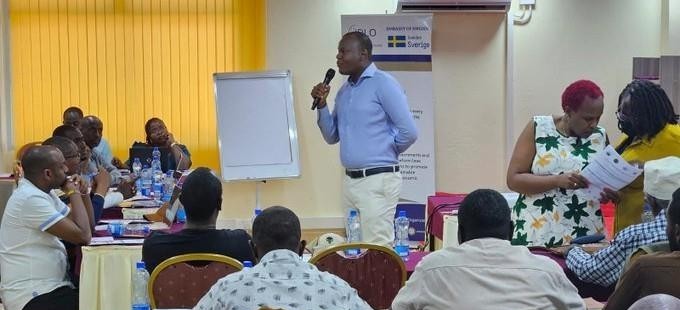Shaping a Greener Future: Empowering Gender-Inclusive Climate Resilience for True Equity
Isiolo, Kenya – In a bold move to address the dual challenges of climate change and gender inequality, the Isiolo Regional Office is participating in a transformative three-day conference that explores the intersection of climate resilience and inclusive governance. The event, titled Enhancing Access to Climate Information, is focused on strengthening policies and practices that prioritise vulnerable communities— especially women, youth, and persons with disabilities—in the fight against climate change.
The theme of this high-level conference, Rethinking Practice, Policy, and Legal Frameworks to Enhance GenderInclusive Climate Governance and Resilience for Vulnerable Communities, sets the stage for reimagining how climate change governance can be shaped to empower communities disproportionately affected by environmental changes.
At the heart of the discussions is the urgent need for policy and legal frameworks that integrate gender considerations, ensuring that women— who are often the most vulnerable to climate-related disasters—are not left behind in adaptation and mitigation strategies.
The conference brings together experts, policymakers, local leaders, and gender advocates to explore how genderinclusive climate governance can be more effectively implemented.
Experts agree that while climate change disproportionately impacts women, particularly in rural areas, their voices often remain underrepresented in decision-making processes. By making climate information more accessible and relevant to women and other marginalized groups, it is hoped that they will be empowered to take charge of climate adaptation strategies in their communities.
"This conference is not just a gathering, but a crucial step towards ensuring that our response to climate change is just, fair, and inclusive. It's about creating a new standard of climate governance that recognises the specific needs of women and vulnerable populations, and not just the technical aspects of climate change itself," said Lotaruk, Isiolo Regional Head.
The conference explores key topics such as gender-responsive climate adaptation, the development of equitable legal frameworks, and the role of traditional knowledge in building community resilience. Local leaders have stressed that in communities like those in Isiolo, where climate-induced droughts and floods are increasingly common, there must be an intersectional approach that places women at the forefront of climate adaptation efforts.
One of the central areas of focus is the role of accessible climate information. In many vulnerable communities, access to reliable weather and climate data is scarce, leaving women and marginalized groups ill-equipped to protect their ~livelihoods. By improving access to such information, particularly in remote areas, communities can better prepare for extreme weather events, ultimately reducing the vulnerability of those who are most at risk.
For true resilience to take root, experts stress the need for inclusive policy reform. Governments must ensure that gender is a central consideration in national climate strategies. This involves moving beyond tokenistic representation and engaging women, particularly those from rural and indigenous communities, in both policy development and implementation.
As the conference draws to a close, there is a renewed sense of urgency and optimism among attendees. The discussions may have started with a focus on gender equality and climate resilience, but they have catalysed a broader conversation on how gender equity can drive effective, sustainable climate governance. Through policy, practice, and legal reform, it is hoped that the progress made in Isiolo will serve as a model for other regions, turning the tide on climate vulnerability and championing a future of inclusivity and equity.
NGEC's Nahashon Lotaruk engaging in impactful discussions at the high-level conference


Comments